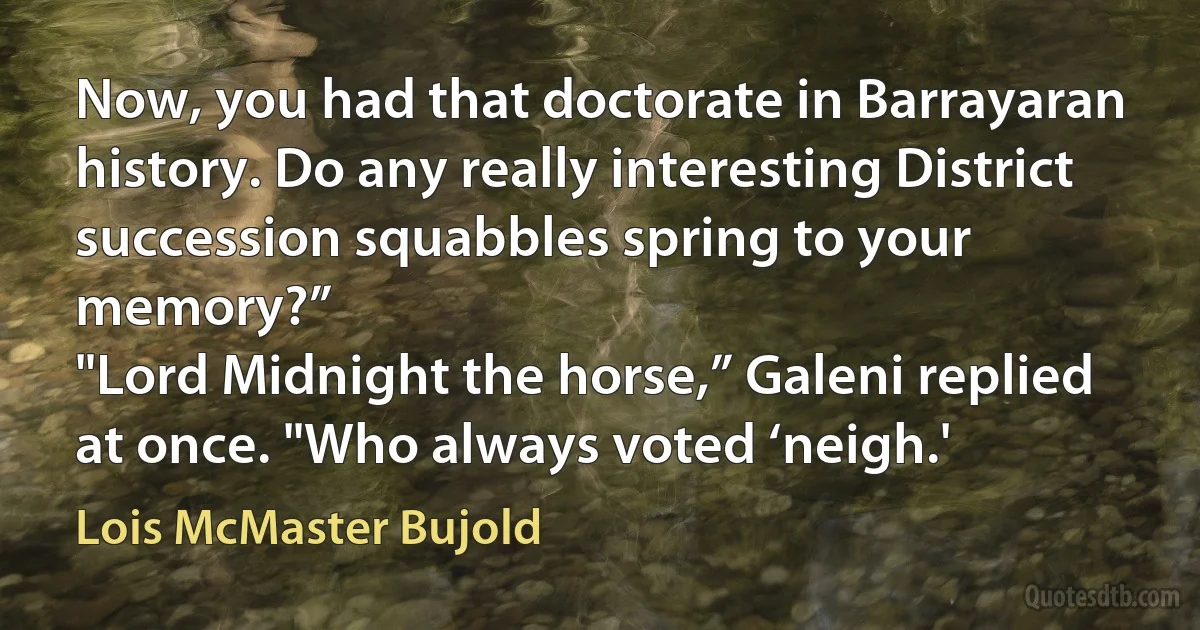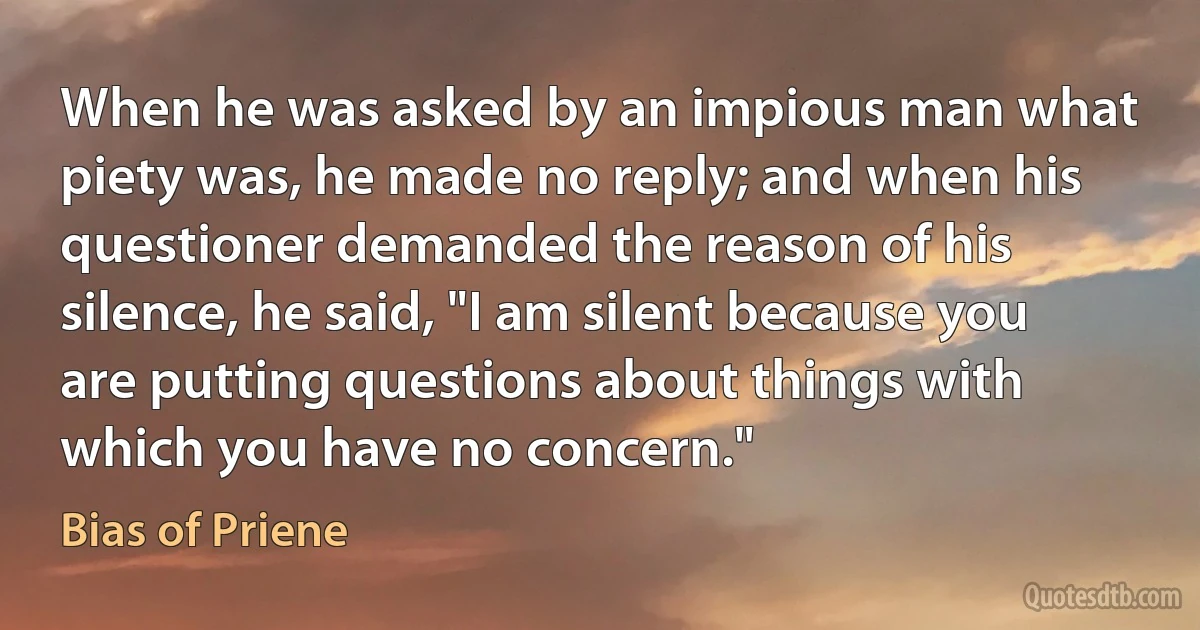Reply Quotes - page 28
When these children are four years old, they shall be sent to the country workhouse and there taught to read two hours a day and kept fully employed the rest of their time in any of the manufactures of the house which best suits their age, strength and capacity. If it be objected that at these early years, they cannot be made useful, I reply that at four years of age there are sturdy employments in which children can earn their living; but besides, there is considerable use in their being, somehow or other, constantly employed at least twelve hours in a day, whether they earn a living or not; for by these means, we hope that the rising generation will be so habituated to constant employment that it would at length prove agreeable and entertaining to them...

William Temple
When I run into couples who recognize me, it's usually the women who are the most friendly. Once, at a Greek restaurant in New York City, a huge family was seated at a table nearby. Late in the evening, the grandmother stood up and said, ‘Tera, I love you! I watch you all night long!' Her daughter almost had a heart attack out of embarrassment. The grandma replied, ‘Honey, I may be old, but I'm not dead yet!'

Tera Patrick
The source of my name,” the vehicle had replied, "The Hundredth Idiot, is a quotation: 'One hundred idiots make idiotic plans and carry them out. All but one justly fail. The hundredth idiot, whose plan succeeded through pure luck, is immediately convinced he's a genius.' It is an old proverb.

Iain Banks
And then the burnt houses. How were they burned? I would ask the locals. Back would come a casual reply. 'They belonged to Hindus and Sikhs. Our fathers and uncles burnt them.' But why? 'So they could never come back, of course.' But why? 'Because we were now Pakistan. Their home was India.' But why, I persisted, when they had lived here for centuries, just like your families, spoken the same language, despite the different gods? The only reply was a sheepish grin and a shrugging of shoulders. It was strange to think that Hindus and Sikhs had been here, had been killed in the villages below. In these idyllic surroundings, the killings and burnings seemed strangely abstract to our young minds. We knew, but could not fully understand, and therefore did not dwell on these awful events till much later.

Tariq Ali
He is face to face with the whole population of England and Scotland, reinforced as it will be by at least one-fifth of the population of Ireland itself, and to threaten 32 millions of people with the vengeance of four millions is a rhetorical artifice which is altogether unworthy of Mr. Parnell's power and influence. (Hear, hear.) But it is said by him that justice requires that we should concede to Irishmen an absolute right to self-government. I would reply that that is a right which must be considered in relation to the security and welfare of the other countries in juxtaposition to which Ireland is placed, and with whose interests hers are indissolubly linked. I cannot admit that five millions of Irishmen have any greater inherent right to govern themselves without regard to the rest of the community than would the five millions of persons who inhabit the metropolis.

Joseph Chamberlain
At eleven o'clock that same night Neville Chamberlain got off an urgent message to Hitler: In view of the increasingly critical situation I propose to come over at once to see you with a view to trying to find a peaceful solution. I propose to come across by air and am ready to start tomorrow.
Please indicate earliest time at which you can see me and suggest place of meeting. I should be grateful for a very early reply.

William L. Shirer
I'm sick of Wilson ... He hailed the Russian Revolution six months ago as the new Golden Age, and I said to Page, "What does he know of Russia?” to which Page replied, "Nothing.” As for his talk about a union of hearts after the war, the world is not made like that.

John Morley, 1st Viscount Morley of Blackburn
In his old age he [Thales] received by common consent the title of sophos, or sage; and when Greece came to name its Seven Wise Men it placed Thales first. Being asked what was very difficult, he answered, in a famous apophthegm, "To know thyself.” Asked what was very easy, he answered, "To give advice.” To the question, what is God? he replied, "That which has neither beginning nor end.” Asked how men might live most virtuously and justly, he answered, "If we never do ourselves what we blame in others.”.

Will Durant
He [Hitler] then asked me what other problems there were between us... I replied that British opinion would be glad to know what might be his present attitude to the League of Nations and to Disarmament. There were no doubt other questions arising out of the Versailles settlement which were capable of causing trouble if they were unwisely handled:-Danzig, Austria, Czechoslovakia. On all these matters we were not necessarily concerned to stand for the status quo as of to-day, but we were very much concerned to secure the avoidance of such treatment of them as would be likely to cause trouble. If reasonable settlement could be reached with the free assent of those primarily concerned, we certainly had no desire to block them.

Edward Wood
When Susan B. Anthony, at eighty, went to hear Eugene Debs speak (twenty-five years before, he had gone to hear her speak, and they had not met since then), they clasped hands warmly, then had a brief exchange. She said, laughing: "Give us suffrage, and we'll give you socialism." Debs replied: "Give us socialism and we'll give you suffrage."

Eugene V. Debs
Weisinger, a couple of years ago, made up the following story: "Isaac Asimov was asked how Superman could fly faster than the speed of light, which was supposed to be an absolute limit. To this Asimov replied, 'That the speed of light is a limit is a theory; that Superman can travel faster than light is a fact.'"

Isaac Asimov
Don't you believe in flying saucers, they ask me? Don't you believe in telepathy? - in ancient astronauts? - in the Bermuda triangle? - in life after death?
No, I reply. No, no, no, no, and again no.
One person recently, goaded into desperation by the litany of unrelieved negation, burst out "Don't you believe in anything?"
"Yes", I said. "I believe in evidence. I believe in observation, measurement, and reasoning, confirmed by independent observers. I'll believe anything, no matter how wild and ridiculous, if there is evidence for it. The wilder and more ridiculous something is, however, the firmer and more solid the evidence will have to be."

Isaac Asimov
How come you write the way you do?” an apprentice writer in my Johns Hopkins workshop once disingenuously asked Donald Barthelme, who was visiting. Without missing a beat, Donald replied, "Because Samuel Beckett was already writing the way he does.”
Asked another, likewise disingenuosly, "How can we become better writers than we are?”
"For starters," DB advised, "read through the whole history of philosophy, from the pre-Socratics up through last semester. That might help.”
"But Coach Barth has already advised us to read all of literature, from Gilgamesh up through last semester....”
"That, too,” Donald affirmed, and turned on that shrewd Amish-farmer-from-West-Eleventh-Street twinkle of his. "You're probably wasting time on things like eating and sleeping. Cease that, and read all of philosophy and all of literature. Also art. Plus politics and a few other things. The history of everything.

Donald Barthelme
Very few people ever had the opportunity to see Cézanne at work, because he could not endure being watched while at the easel. For one who has seen him paint, it is difficult to imagine how slow and painful his progress was on certain days. In my portrait there are two little spots of canvas on the hand which are not covered. I called Cézanne's attention to them. "If the copy I'm making in the Louvre turns out well," he replied, "perhaps I will be able tomorrow to find the exact tone to cover up those spots. Don't you see, Monsieur Vollard, that if I put something there by guesswork, I might have to paint the whole canvas over starting from that point?" The prospect made me tremble.
During the period that Cézanne was working on my portrait, he was also occupied with a large composition of nudes, begun about 1895, on which he labored almost to the end of his life.

Paul Cézanne
Several conversations that Feynman and I had involved the remarkable abilities of other physicists. In one of these conversations, I remarked to Feynman that I was impressed by Stephen Hawking's ability to do path integration in his head. "Ahh, that's not so great", Feynman replied. "It's much more interesting to come up with the technique like I did, rather than to be able to do the mechanics in your head." Feynman wasn't being immodest, he was quite right. The true secret to genius is in creativity, not in technical mechanics.

Richard Feynman
[Manet's reply:] They're not dancing, they'e skating; but you're right, they do move and when people are moving, I can't freeze them on the canvas. As a matter of fact, sir, I have been told the outlines of 'Olympia' are too well defined, so that makes up for it.
Sir Frederick Leighton criticized: It's very good, Monsieur Manet, but don't you think that the outlines [of Manet's painting 'Le Skating' ] are not well enough defined and that the figures dance too much?

Édouard Manet
Night hung its blue over the garden. Satan fell asleep. He had a dream, and in that dream, soaring over the earth, he saw it covered with angels in revolt, beautiful as gods whose eyes darted lightning. And from pole to pole one single cry, formed of a myriad cries, mounted towards him, filled with hope and love. And Satan said:
"Let us go forth! Let us seek the ancient adversary in his high abode." And he led the countless host of angels over the celestial plains. And Satan was cognizant of what took place in the heavenly citadel. When news of this second revolt came thither, the Father said to the Son:
"The irreconcilable foe is rising once again. Let us take heed to ourselves, and in this, our time of danger, look to our defences, lest we lose our high abode."
And the Son, consubstantial with the Father, replied:
"We shall triumph under the sign that gave Constantine the victory."

Anatole France
"What has he in the bag?" I inquired, not knowing why I asked. And after a long silence the voice replied: "The four magic symbols, the sceptre, the cup, the sword and the pentacle. The fool always carries them, although he has long since forgotten what they mean. Nevertheless they belong to him, even though he does not know their use. The symbols have not lost their power, they retain it in themselves.

P. D. Ouspensky



